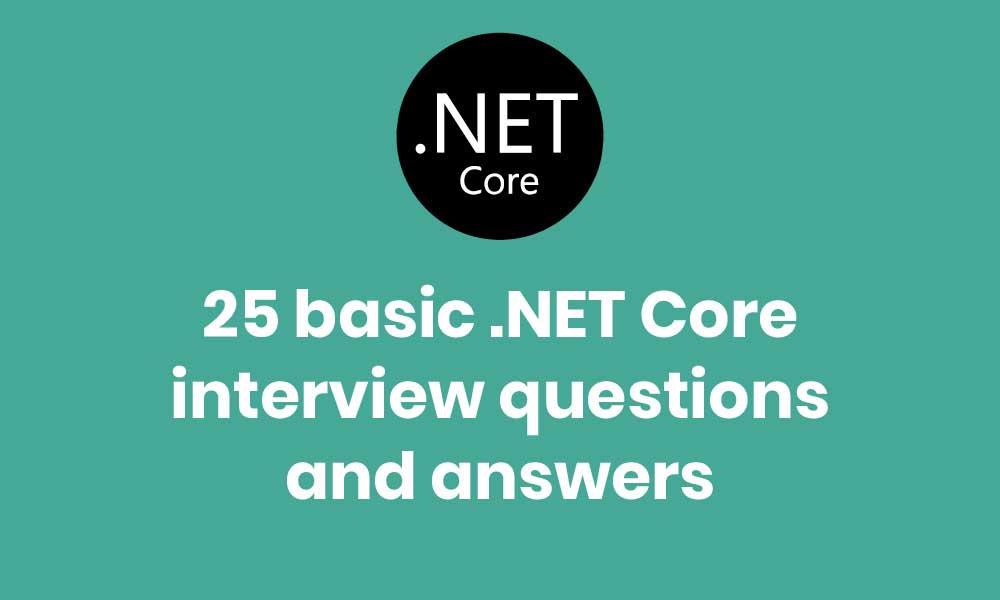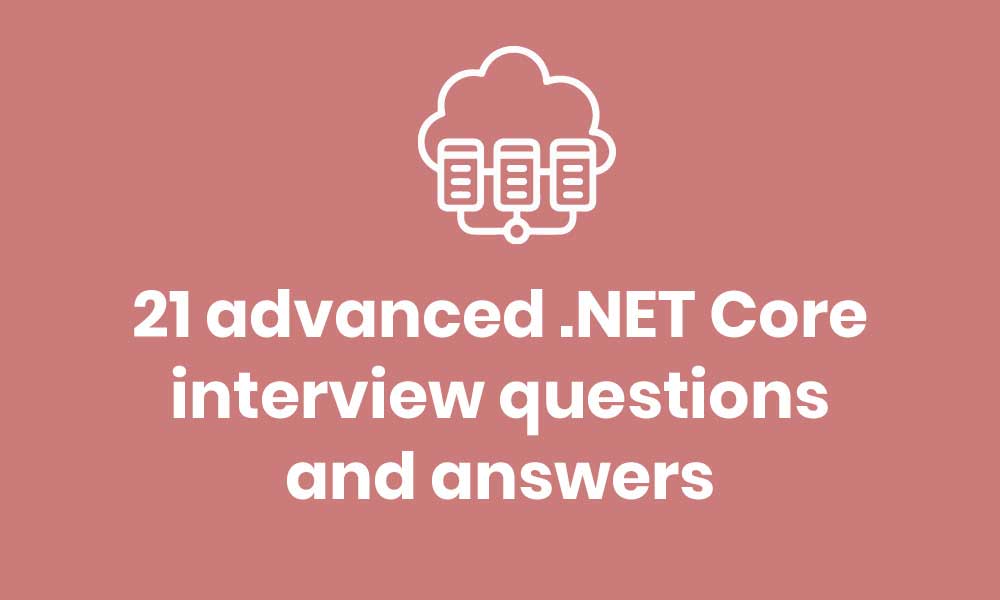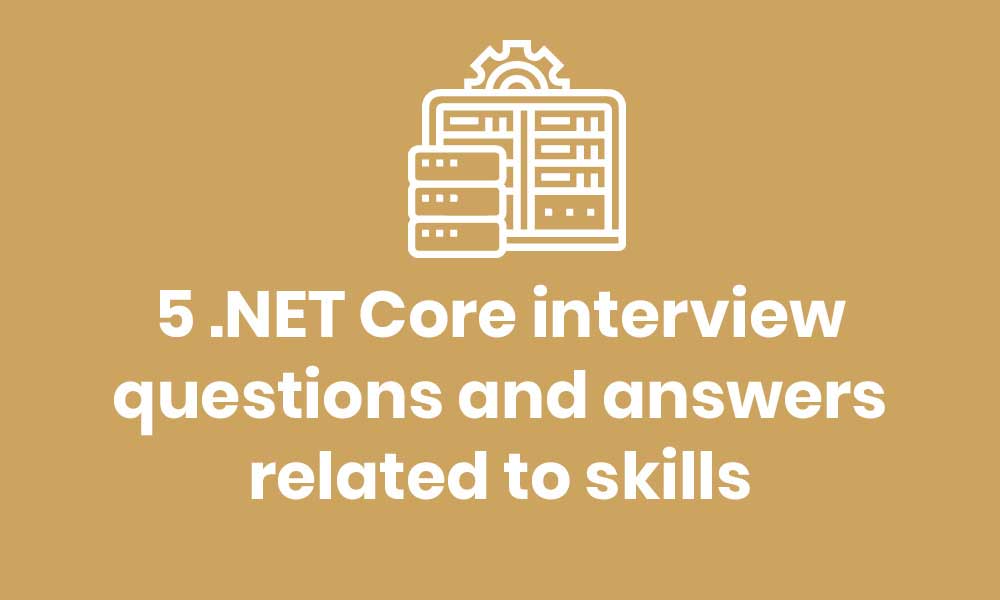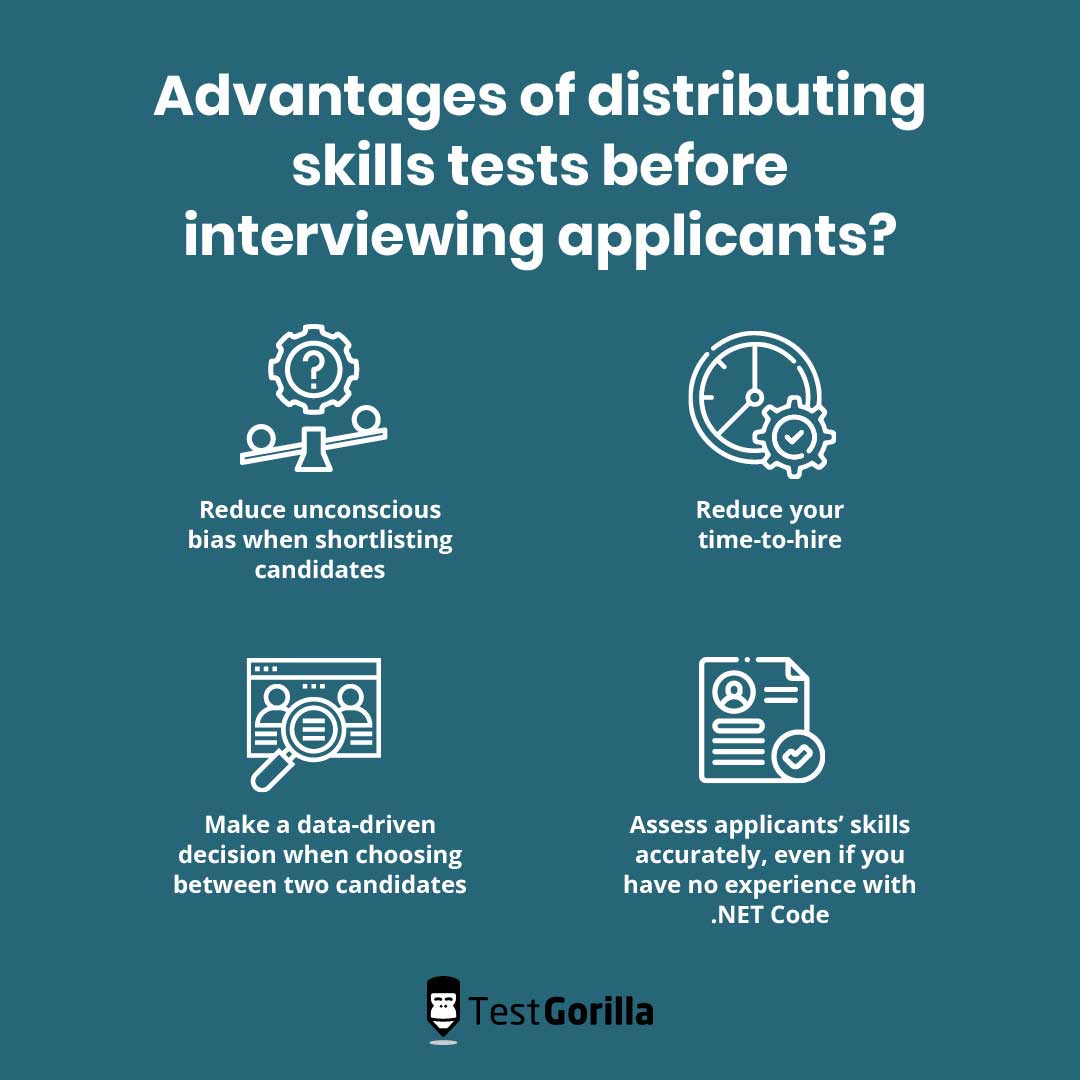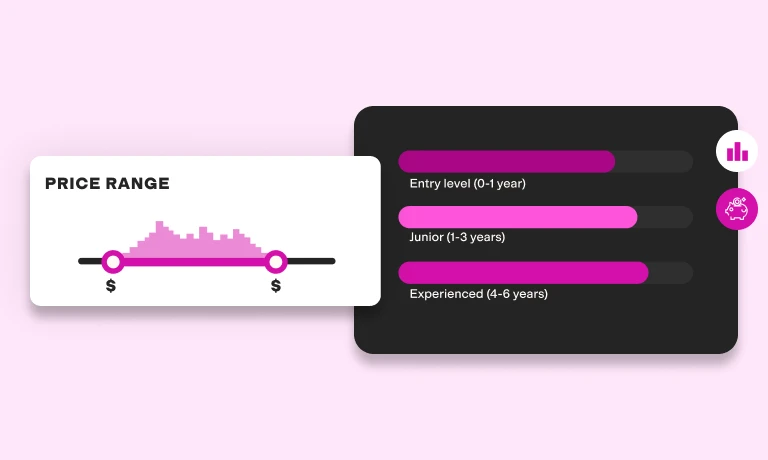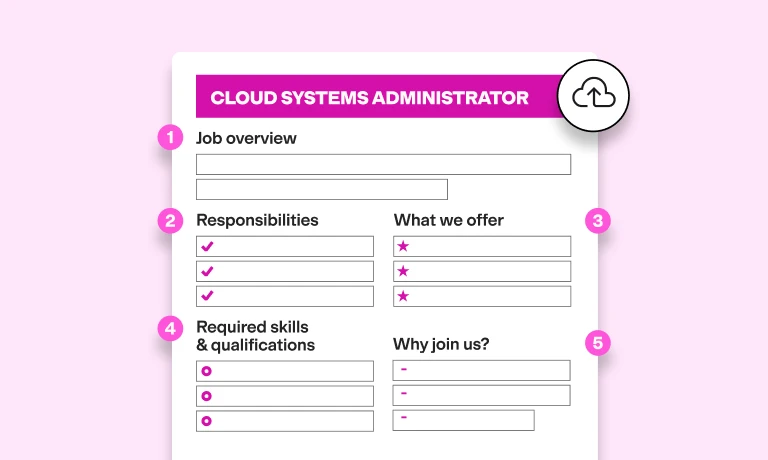51 .NET Core interview questions to ask candidates and hire a pro
Finding a .NET Core expert for your team can be difficult. You must find out if they have the .NET Core knowledge to join your team and the right skills to complete challenging projects.
If you use skills tests such as our ASP.NET (plus ASP.NET Core) test, you’ll have an easy way of knowing who your best candidates are and who to shortlist for an interview.
But what if you haven’t yet prepared enough .NET Core interview questions for the interview stage?
Don’t worry – this article is for you! In it, we’ve listed 51 interview questions you can use to assess your applicants’ .NET Core skills, along with sample answers to guide you during the evaluation process.
Check out our questions below to help you prepare for the interview stage.
Table of contents
- 25 basic .NET Core interview questions and answers to review your candidates
- 21 advanced .NET Core interview questions and answers to assess your candidates
- 5 .NET Core interview questions and answers related to skills
- When should you use skills tests during the hiring process?
- What are the other advantages of distributing skills tests before interviewing applicants?
- 6 tips for using .NET Core interview questions when hiring
- Find the best expert for your team using .NET Core interview questions
25 basic .NET Core interview questions and answers to review your candidates
Here are 25 basic .NET Core interview questions to assess applicants’ overall knowledge. Use the sample answers as a guide to evaluate your candidates’ skills and experience.
What do you do to improve your skills related to .NET Core?
Whether your applicant is working on their front-end technology skills like JavaScript or aims to become more proficient in debugging in Visual Studio IDE (Integrated Development Environment), consider their methods.
Have they enrolled for a course? Are they working on any side projects using .NET Core? You can assess related skills using skills tests, such as our JavaScript test.
What does .NET Core enable developers to do?
Your applicants should know that .NET Core enables developers to build web services, web applications, and Internet of Things (IoT) applications for Windows, Mac, and Linux. Developers can also run applications on the cloud and devices with .NET Core.
Name five advantages of .NET Core compared with ASP.NET.
There are several advantages of using .NET Core instead of ASP.NET.
Applicants should know that .NET Core is ideal for deploying applications on several servers, such as Apache, Nginx, and Docker, and is a cloud-enabled framework that offers up-to-date HTTP request pipelines.
Developers can also integrate client-side frameworks such as Angular and use C# code in the browser.
What is the most recent version of .NET Core?
Applicants familiar with .NET Core should know that the most recent version is .NET 6. They may know that Microsoft released it in November 2021 and mention that it unifies runtime and base libraries for mobile, desktop, cloud, and Internet of Things applications.
Name three features of .NET Core.
Candidates should know that .NET Core:
Is open source: Developers can access source code freely from the open-source framework
Supports several programming languages: Developers can use several programming languages with .NET Core
Offers cross-platform support: Developers can port a code from one platform, like Linux or Windows, to another one, like MacOS
Is it possible for developers to use ASP.NET Core with the .NET framework?
If your candidates are familiar with .NET Core, they should know that developers can use it with the .NET framework.
Explain what garbage collection is.
Do your applicants know that garbage collection is a process that developers use to collect and remove programs that they are no longer using?
Can they explain that this process helps developers increase the memory space and that the garbage collector works like a memory manager?
How is .NET Core different from .NET?
There are several differences between .NET Core and .NET.
Your applicants may explain that the .NET Core framework is open source, while only some of the .NET framework’s components are open source.
They may also explain that the .NET Core framework is cross-platform, while the .NET framework only runs on Windows.
Applicants may also mention that developers can install different components of the .NET Core framework as needed, while it’s only possible to install the entire package with the .NET framework.
Name four programming languages you can use with .NET Core.
Applicants should know that developers can use several languages with .NET Core. Can they name four examples? For example, they may mention C++, F#, Visual Basic, and C#.
Explain the difference between .NET Core and Mono.
Applicants should know that .NET Core is part of the .NET framework developers use to make modern application development easier. They may explain that while Mono is also a .NET framework extension, Xamarin optimizes it.
Candidates should also know that Mono’s base library is Mono Class and that .NET Core’s base library is CoreFX Class.
Explain what CoreCLR is.
Do your applicants know that CoreCLR is .NET Core’s runtime engine? Can they explain that developers use it to execute programs in various programming languages?
Your applicants should also know that it features key components, such as the JIT compiler, garbage collector, CLS, and CTS.
Explain what CTS is.
CTS, short for Common Type System, is a system that developers use for cross-language integration. It’s also ideal for defining data types and enabling the .NET framework to understand them. It’s a single-rooted object-based hierarchy.
Name two data types the CTS supports.
Candidates should be able to name two data types that the CTS supports:
Reference types that store memory address references
Value types that include standard primitive types (also known as built-in value types)
Explain what Kestrel is.
Do your applicants know that Kestrel is a web server that works across different platforms?
Can they explain that developers can use it as the default option by using .NET Core project templates, and do they know that it supports Unix sockets, HTTPS, and HTTPS/2?
Explain what CoreFX is.
Candidates should know that CoreFX refers to the foundation-class libraries of .NET Core. Can they outline the main components that the Core FX features, including class types, consoles, collection types, and XML?
How frequently does garbage collection occur?
Applicants who have used .NET Core frequently will know that garbage collection happens on an ongoing basis when certain conditions require it.
Candidates may also outline a few conditions in which garbage collection is triggered, such as low physical memory when the memory space exceeds a certain threshold due to allocated objects. It can also happen when developers call the GC.Collect method.
Explain what MSIL is. What does it do?
Beyond explaining that MSIL stands for Microsoft Intermediate Language, candidates should know how it works. They should know that .NET codes convert to MSIL before the CLR interprets it.
Explain what SDK is in .NET.
Candidates with sufficient knowledge of .NET should know that SDK is a collection of libraries and tools. Developers use SDK to create .NET applications and libraries.
Can your candidates also explain that the .NET SDK also features the CLI and the dotnet driver?
How is SDK different from runtime in .NET Core?
Skilled applicants should know that runtime is the smallest self-contained component which completes the applications’ execution and running stages. In contrast, developers use the SDK to complete application development and building stages.
Explain what .NET Core middleware refers to.
.NET Core middleware refers to software that developers assemble and integrate into the pipeline of an application to handle requests and responses.
Can your applicants also explain that if a developer wants to implement middleware in an application, they must use the Configure() method?
Explain what .NET Standard is.
Candidates with a basic understanding of .NET Core should know that developers can use .NET Standard to create a shared library that they can use again with any .NET platform. They should also know that .NET Standard is a specification that determines what the base class library needs to implement for easy code sharing. The code is shared between applications running on different platforms.
Describe the main three architectural components of .NET Core.
The three key architectural components of .NET Core are:
Libraries: Framework libraries feature base libraries and components such as app composition types
SDK compilers: SDK compilers make it easier for developers to build applications or programs in .NET Core
.NET Core runtime: With garbage collection and type safety features, the .NET Core runtime component works to optimize the app’s functioning
Explain what unit testing refers to.
Unit testing is beneficial for simultaneous program building and testing. Applicants should know that unit testing involves reducing a program to units, which are small chunks of code. Developers test each unit to see whether they produce the expected value.
Explain what NuGet packages are.
Candidates with a good understanding of .NET Core will know that NuGet packages are zip files containing code-related files, codes, and descriptions. The packages contain metadata and libraries that developers can share using a private or public host publication method.
Explain what an empty migration is.
Can your applicants explain that developers may create code files with empty classes if they add migrations but do not change the model?
21 advanced .NET Core interview questions and answers to assess your candidates
Check these 21 advanced .NET Core interview questions and answers to review your candidates’ knowledge and determine whether they have the advanced skills necessary for your role.
1. Explain what explicit compilation or ahead-of-time compilation means.
Explicit compilation or ahead-of-time compilation is an approach that developers use to convert higher-level language into code before they execute a project and before the interaction stage. It’s called ahead-of-time compilation because it occurs before the interaction between the program and the CPU.
2. Name three advantages of ahead-of-time compilation.
Some notable advantages of ahead-of-time compilation your candidates may mention include faster component rendering, a more compact application size, early template parse-error protection, and improved program security.
3. What is Docker in .NET Core?
If developers need to publish applications after development, they can use the service container known as Docker.
With Docker, developers package their applications in containers and manage them using Git. It’s also possible to synchronize the application across different machines.
4. Explain what the IGCToCLR interface is.
Do your applicants know that developers use the IGCToCLR interface to communicate with the runtime environment? Can they explain that this interface works by passing arguments to the InitializeGarbageCollector function?
5. Explain what a class library is.
Applicants with advanced .NET Core knowledge will know that a class library features code templates and classes that a developer has rewritten. With the class library, developers can use the templates to develop applications.
6. Explain how you would create a class library.
Candidates should explain that creating a class library begins by right-clicking the solution and navigating to “Add” and then “New Project”. They can then select the “Class Library” option under .NET Standard and choose a class library template.
7. What does webHostBuilder() do?
Do your applicants know that webHostBuilder() is a function developers can use to create a web host for their web applications? Can they explain that the function helps developers to configure the bits for the host to run the app?
8. Name a situation when you would generate SQL scripts with .NET Core.
Applicants may know that developers will have to generate SQL scripts when deploying, applying, and adding migrations. The purpose of generating these scripts is to help the developer enhance the migrations’ accuracy and the databases’ schema changes.
9. How is the task different from the thread in .NET Core?
There is one crucial difference between task and thread in .NET Core. Can your candidates explain that tasks are the things developers need to do, while threads provide a method for accomplishing the tasks?
Candidates should know that threads are parts of a task and that developers can control them using a few functions such as abort(), suspend(), or resume().
10. How is RyuJIT different from Roslyn?
Can your applicants explain that the Roslyn .NET Core compiler compiles Visual Basic or C# code to the IL (the intermediate language), while the RyuJIT is a different compiler type?
Do they know that RyuJIT is a just-in-time compiler that compiles intermediate language to code, such as Visual Basic or C#?
11. What does state management refer to?
State management maintains a page or application’s state until the user session ends.
Do your applicants know that state management in .NET Core refers to controlling the state of an object or variable?
Can they name and explain the two main types of state management in .NET Core (client-side and server-side state management)?
12. Explain what the hosting environment is.
Candidates should know that the hosting environment features details related to the application, including functions, the location in which it’s stored, and app management storage. They may also explain that the hosting environment helps developers to complete application management and work across several environments.
13. Name three JIT compilers.
As well as explaining that JIT compilers convert a developer’s source code into executable code through a compilation process, candidates should know the three main examples of JIT compilers. Do they know that the main examples are normal, Econo, and pre-JIT compilers? Can they explain what each of these JIT compilers does?
14. What is the debug class?
Developers use the debug class to access methods and properties when debugging their code. They can enhance the robustness of their code and avoid affecting the application’s code size or performance using the debug class and check their logic using assertions.
15. How is managed code different from unmanaged code?
While managed code executes under the runtime’s control, unmanaged code runs outside the runtime’s control. Applicants should know that .NET is called “managed code”. The system implements the code in a managed runtime environment.
16. Explain what the trace class is.
The trace class helps developers chart a code’s execution pathway or retrieve execution information. Interviewees may mention that developers can use the trace class for a larger scope of work than the debug class, as they can also use it to release builds and debug code.
17. Explain what MEF means in .NET Core.
Can your applicants explain that MEF means “Managed Extensibility Framework”? Do they know that it’s a library that developers can use to develop lightweight, extensible applications? Candidates should know that MEF enables developers to find and use extensions without configuring them and that it’s available in .NET Core.
18. Explain what UWP apps are in .NET.
Can your interviewees explain that UWP means “Universal Windows Platform”?
Do they know that developers can use this platform to facilitate client application building for Windows and that it works with applications that run on Windows 10 and 11 devices, such as PCs?
19. Explain what MSBuild is.
Developers use Microsoft Build, known as MSBuild or Microsoft Build Engine, to build applications. It is an engine that provides developers with XML schemas for project files. These XML schemas control the way the build platform processes software.
20. Explain what CoreRT is.
The CoreRT is the toolset of .NET Core. Its job is to complete the transition between the compilation and translation processes. Do your candidates know that the CoreRT uses the RyuJIT compiler for compiling bytecode to machine code?
21. How useful is dependency injection?
Since a dependency injection can solve several problems, it can be very useful for developers. With the dependency-injection framework, developers can use base classes to abstract dependency implementation.
They can also create an instance with the dependency injection; when they’re not required anymore, they are destroyed.
The best insights on HR and recruitment, delivered to your inbox.
Biweekly updates. No spam. Unsubscribe any time.
5 .NET Core interview questions and answers related to skills
Find out whether your applicants have the right skills needed to complete complex projects by asking these five .NET Core interview questions. Check the sample answers to review your applicants’ responses.
1. How would your team members rate your communication skills?
Communication skills are crucial for .NET Core experts, so ask your candidates this .NET Core interview question to determine whether they’re efficient communicators.
When they answer this question, candidates should provide examples of situations when their communication skills have helped them complete projects in .NET Core.
With our Communication skills test, you can check whether their communication skills are on a par with what you need.
2. Why are problem-solving skills important when using .NET Core?
Problem-solving skills are a critical part of using .NET Core for several reasons.
.NET Core developers may need to complete code reviews or debugging due to an error in the source code. They may need to develop a scalable solution to handle complex challenges or plan how an end user will benefit from it to not overbuild it.
You can assess your applicants’ problem-solving skills with our Problem Solving test.
3. How would you rate your React skills when using .NET Core?
In addition to older front-end technologies such as JavaScript, .NET Core developers should know how to use newer frameworks and libraries, including React, as many projects use these two technologies.
Candidates may explain that they have used the React library as a user interface renderer and provide an example of the project they used it for. If you need to review your applicants’ React skills more thoroughly, use our React online test.
4. Explain why cloud technology skills like Microsoft Azure are important with .NET Core.
Since various clients now want developers to build applications in the cloud for effortless scalability, cloud technology skills like Microsoft Azure are useful for developers creating .NET Core web applications. Review whether your candidates have the right cloud technology knowledge, such as Azure, by asking them this .NET Core interview question and asking them to complete an Azure skill test.
5. How would your team members rate your time-management skills?
Strong time-management skills enable developers to complete projects within deadlines and maintain high quality in their work.
Ask your candidates this .NET Core interview question to review their time-management skills and ensure your applicants can balance speed and efficiency.
You can also review these skills with a Time Management test.
When should you use skills tests during the hiring process?
The optimum time to use skills tests, such as our ASP.NET test, is right after you source candidates. Thank them for applying and invite them to take a skills assessment, consisting of up to five skills tests, to accurately assess their skills and experience.
This enables you to quickly identify the best candidates who have the right abilities and knowledge for your open role and filter out those who don’t.
After that, you simply need to invite your top applicants to an interview to further assess their skills. You can even ask your candidates questions about their skill-test results during the interview to get a better understanding of their expertise.
What are the other advantages of distributing skills tests before interviewing applicants?
There are several advantages and reasons you should use skills tests before completing .NET Core interviews with your candidates. Skills tests enable you to:
1. Reduce unconscious bias when shortlisting candidates
By asking candidates to complete a .NET Core skills assessment right after you receive their applications, you won’t need to worry about unconscious bias affecting your shortlisting process.
The candidates’ results will tell you all you need to know about their .NET Core proficiency and whether their skills meet your requirements and expectations. You won’t need to let a gut feeling lead you. Just check the results and choose the most skilled candidates.
2. Reduce your time-to-hire
Instead of trying to guess whether your applicants’ .NET Core skills are sufficient based on the information you have from their resumes, you can simply use a .NET Core skills test.
The average time to fill a role is currently 42 days but you can reduce it significantly if you use the right methods to assess your applicants’ skills accurately and objectively. This will enable you to concentrate only on your best candidates during the interview process and make it much more efficient.
3. Make a data-driven decision when choosing between two candidates
If you use skills tests, your decision to shortlist a candidate won’t just depend on their skills and how they match your expectations.
It’ll also depend on how their skills compare to those of other applicants. If you find two applicants with similar profiles and experience, you can simply look at their skills test results to see who’s a better fit for your company and for the role.
4. Assess applicants’ skills accurately, even if you have no experience with .NET Code
If you don’t have the technical skills to accurately assess applicants’ .NET Core knowledge, using a skills assessment can be super helpful.
Subject-matter experts craft our tests, which are then reviewed by other professionals to evaluate their accuracy and validity. Even if you have zero experience with .NET Code, you can quickly see whether someone is a proficient user of the framework by simply checking their test results.
6 tips for using .NET Core interview questions when hiring
Before interviewing .NET experts, consider these six tips for using our .NET Core interview questions during the recruitment process.
1. Start with skill testing
Don’t skip straight to the interview phase – instead, use a skills test first to accurately assess applicants’ skills and shortlist the best. This will enable you to save time and effort and be more objective when deciding who to interview.
Always start with skill testing after you source candidates to make faster, data-driven hiring choices.
2. Ask candidates about their experience using .NET Core
Does your candidate have enough experience using .NET Core? Have they tried to learn more about how you’re using .NET Core at your company?
Make sure you ask candidates about their experience using .NET Core and their motivation to upskill to determine whether they are a good match for your role.
If your applicants don’t have sufficient experience, ask follow-up questions to learn if they’re working on developing their .NET Core skills.
For instance, you may ask, “How are you trying to get better at solving problems when using .NET Core?” or “How are you trying to improve your debugging skills?”
3. Use questions of the right difficulty level for your role
Matching the question difficulty with your applicants’ skill level and the requirements for the role is important. Stick to basic .NET Core interview questions when interviewing junior-level candidates and ask advanced questions when interviewing senior developers.
Using this approach doesn’t mean you can’t ask follow-up questions. For example, if you ask a junior-level candidate a question about the key features and benefits of .NET Core and they only mention that it’s open source, invite them to tell you about its other features.
Don’t assume a candidate isn’t skilled enough just because they gave a short answer to a specific question – they might be too nervous and need a minute or two to gather their thoughts and provide a more detailed answer.
4. Ask open-ended questions
Asking open-ended .NET Core interview questions will help you get full answers from your candidates and obtain more information than if you simply ask yes-or-no questions.
For example, if you want to learn whether your candidates are familiar with unit testing, ask them, “Tell us more about your understanding of unit testing”, rather than simply “Do you have experience with unit testing?”
If your candidate provides a short answer, use follow-up questions to learn more about their knowledge.
5. Lead the interview and listen carefully to your applicants’ responses
During interviews, you need to be an active listener. Ensure you listen carefully to your candidates’ responses after each question and give applicants enough time to answer without interrupting them.
It’s also vital to be mindful of non-verbal cues and determine whether your applicants seem confident when answering. This can reveal more about their soft skills, motivation, and attitude toward their work.
6. Use results from the skills assessments and interviews to hire an expert
At this point, you’ll have all the data you need to choose the best .NET Core expert for your team.
Look at skill-assessment results again and compare them with the information you’ve collected during interviews. Do they align? Are there any discrepancies or red flags? Who performed best at skills tests and interviews?
Discuss the results from all stages of the recruitment process with your hiring team and choose your next expert based on the data.
Find the best expert for your team using .NET Core interview questions
Determining whether your applicants have the required .NET Core skills and knowledge to join your team isn’t easy, but the methods mentioned in this article will help you.
Use our ASP.NET (including ASP.NET Core) test to review your candidates’ knowledge right after they apply for your open role.
Once you have their test results, select the candidates whose knowledge and experience match your requirements. Invite them to an interview to further assess their skills and ask them some of the .NET Core interview questions from our article.
Discuss the performance of your candidates with your hiring team and pick the best person for your open role.
With TestGorilla’s skills tests and our .NET Core interview questions, finding the right candidate doesn’t have to be complicated. Get started for free today.
You've scrolled this far
Why not try TestGorilla for free, and see what happens when you put skills first.


